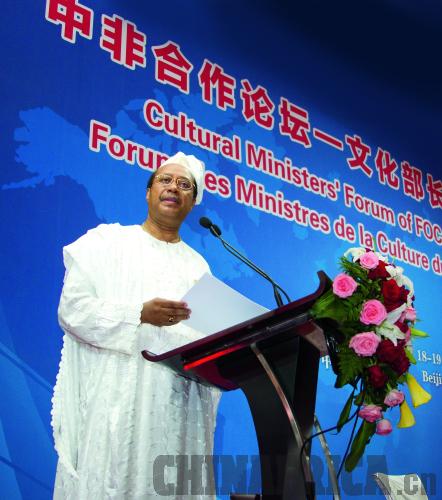|
 |
|
ARTS FOR ALL:Chinese and African leaders believe all people should have access to the arts (WANG XIANG) |
South African Minister of Arts and Culture Paul Mashatile becomes excited when discussing Chinese culture. He knows Jackie Chan and Bruce Lee, well-known Chinese kungfu stars, and can make a long list of Chinese foods he likes, such as Peking duck, noodles, dumplings and many dishes.
"Culture, in the form of art and food for instance, brings us together, making Chinese know who we are and us Africans know who you are," Mashatile said in an interview with ChinAfrica.
He highlighted the significance of people-to-people communication between China and Africa and called for more Sino-African cooperation in the field of culture at the Culture Ministers' Forum, part of the Forum on China-Africa Cooperation (FOCAC).
Held from June 18 to 19, the cultural forum gathered 45 African cultural ministers and minister representatives in Beijing to assess the implementation of relevant measures stipulated in the FOCAC Sharm el-Sheikh Action Plan (2010-12), and make new commitments to deepen future cultural exchanges. Besides ongoing commitments, the ministers signed the Beijing Declaration and agreed to make joint efforts to promote cultural industries, protect cultural heritage and enhance the development of culture-related human resources.
As the host of the 2012 African Culture in Focus, China will hold performances, exhibitions and symposiums from May to the end of this year in Beijing, Nanjing, Hangzhou and other major Chinese cities.
Strategic role of culture
Cultural exchanges between China and Africa have been highlighted since the establishment of FOCAC in 2000. At the Beijing Summit of FOCAC in 2006, cultural relations were upgraded to a strategic level, gaining equal significance to political and trade relations. After years of joint efforts in promoting cultural cooperation, the two sides reached a consensus that achievements in this field injected inspiration and cultural endorsement to China-Africa cooperation and made a positive contribution to the comprehensive, balanced and sustainable development to the new type of China-Africa strategic partnership as stipulated in the Beijing Declaration at the Cultural Ministers' Forum of FOCAC.
Nigerian Minister of Culture and Tourism Edem Duke expressed his satisfaction on the fruitful cultural exchanges in recent years during his address at the opening ceremony of the forum on behalf of all the African delegates. "We have witnessed that the exchanges strengthened mutual friendship and enhances the wellbeing for both Chinese and Africans," he said.
As for the function of culture in the bilateral relations, Liu Hongwu, Director of the Institute of African Studies with Zhejiang Normal University, told ChinAfrica that culture was the foundation for the sustainable development of Sino-African relations.
However, delegates from the two sides have a different view in relation to the development of cultural relations compared with political and economic relations. "I am satisfied with current cultural cooperation between China and Africa," Ama Tutu Muna, Minister of Culture of Cameroon told ChinAfrica. While approving recent cultural exchanges roles in promoting mutual trust, Liu maintained that the overall development extent of cultural relations lagged behind that of political and trade efforts. "Geographical remoteness as well as language and cultural barriers hinder cooperation between two sides," Liu said.
Economic angle
Boasting of rich cultural resources, China and Africa face a common challenge in how to translate these resources to economic benefits for the wellbeing of the people. "Culture is not only entertainment, it is also about business, and about jobs," Paul Mashatile told ChinAfrica, adding that culture had become a major driving force for economic growth in many countries.
Promoting tourism is a good option as it will not only foster cultural exchanges but also bring revenue. "Each African country has huge potential in attracting tourists with unique culture and natural scenes. Cooperation in exploring tourism culture will bring opportunities for both Africa and China," Daniel Liwimbi, Minister of Tourism and Culture of Malawi, said at the forum.
As for the cultural industry, Yu Peng, Deputy Director General of Bureau for External Cultural Relations of China's Ministry of Culture, believed China was also at the initial stage of exploring cultural resources. "China and Africa need to jointly seek ways of transferring their respective unique cultural elements into products and promote them in each other's domestic markets," he told ChinAfrica. He noted efforts on combining cultural exchanges with the development of economy and improvement of local people's livelihood achieved good results.
In 2010, China's Ministry of Culture sent craftsmen from Qinghai and Guangdong provinces to Benin and Lesotho to train locals in techniques of thread inlaying and pottery. "Such trainings bring Africans skills and were well-received," Yu said.
When undertaking cooperation in the cultural industry with African countries, enterprises were certain to be involved. Zhang Hongmin, Deputy Director of Institute of West-Asian and African Studies with Chinese Academy of Social Sciences, warned that these Chinese enterprises should run culture-related business with prudence. "Failure in cooperation of the cultural industry may lead to irretrievable outcomes as culture is the foundation of bilateral relations," Zhang told ChinAfrica.
|